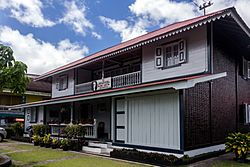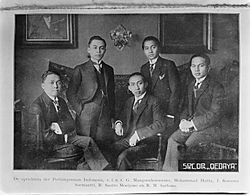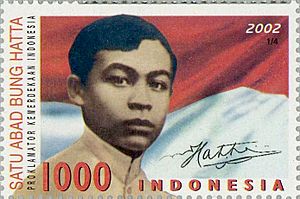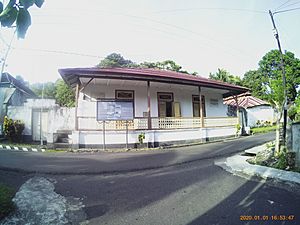Mohammad Hatta facts for kids
Quick facts for kids
Mohammad Hatta
|
|
|---|---|
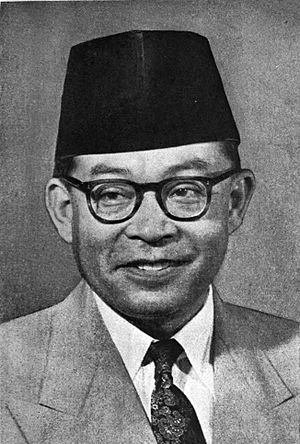
Mohammad Hatta in 1954
|
|
| 1st Vice President of Indonesia | |
| In office 18 August 1945 – 1 December 1956 |
|
| President | Sukarno |
| Preceded by | Office established |
| Succeeded by | Hamengkubuwono IX |
| 3rd Prime Minister of Indonesia | |
| In office 29 January 1948 – 20 December 1949 |
|
| President | Sukarno |
| Preceded by | Amir Sjarifoeddin |
| Succeeded by |
|
| Prime Minister of the United States of Indonesia | |
| In office 20 December 1949 – 6 September 1950 |
|
| President | Sukarno |
| Preceded by | Office established |
| Succeeded by | Office abolished |
| Minister of Defence of Indonesia (acting) |
|
| In office 29 January 1948 – 15 July 1948 |
|
| President | Sukarno |
| Preceded by | Amir Sjarifoeddin |
| Succeeded by | Hamengkubuwono IX |
| Foreign Minister of Indonesia (on Government of the United States of Indonesia) |
|
| In office 20 December 1949 – 6 September 1950 |
|
| President | Sukarno |
| Preceded by |
|
| Succeeded by | Mohammad Roem |
| 1st Chairman of Indonesian Red Cross Society | |
| In office 1945–1946 |
|
| Preceded by | Office established |
| Succeeded by | Mas Sutardjo Kertohadikusumo |
| Personal details | |
| Born | 12 August 1902 Fort de Kock, Dutch East Indies |
| Died | 14 March 1980 (aged 77) Jakarta, Indonesia |
| Resting place | Tanah Kusir Public Cemetery, South Jakarta, Indonesia 6°15′10″S 106°46′15″E / 6.2528676°S 106.7708361°E |
| Political party | Independent |
| Spouse |
Rahmi Rachim
(m. 1945) |
| Children | 3, including Meutia Farida Hatta |
| Alma mater | Erasmus University Rotterdam (drs.) |
| Signature |  |
Mohammad Hatta (born August 12, 1902 – died March 14, 1980) was a very important Indonesian leader. He was the country's first vice president. People called him "The Proclamator" because he, along with Sukarno (who became Indonesia's first president), fought for Indonesia to be free from Dutch rule. Hatta was born in a place called Fort de Kock (now Bukittinggi) in what was then the Dutch East Indies. He studied in Dutch schools in Indonesia and later in the Netherlands from 1921 to 1932.
Contents
Early Life and Education
Growing Up in Bukittinggi
Mohammad Hatta was born on August 12, 1902, in Fort de Kock (now Bukittinggi). His family was well-known and very religious. Sadly, his father passed away when Hatta was only eight months old. He was then raised by his mother's family. They were quite wealthy, which allowed Hatta to learn the Dutch language and study the Quran after school.
School Days in Padang
From 1913 to 1916, Hatta went to a Dutch elementary school in Padang. When he was thirteen, he passed an exam that would let him go to a Dutch high school in Batavia (now Jakarta). But his mother wanted him to stay in Padang because he was still too young. So, Hatta went to a junior high school instead.
In his free time, Hatta worked part-time at a post office. He was also very interested in football and became the chairman of his school's team. This helped him meet many different people. At sixteen, Hatta became interested in politics. He was chosen as the treasurer for the youth association of Sumatra in Padang.
Time in the Netherlands
Higher Education in Rotterdam
In 1919, Hatta finally went to high school in Batavia. He did very well and in 1921, he went to study at Erasmus University Rotterdam in the Netherlands. He studied economics and earned a special degree in 1932. He planned to get a doctorate, but politics became more important to him.
Fighting for Independence Abroad
In the Netherlands, Hatta joined a group called the Indies' Association. In 1922, this group changed its name to Perhimpoenan Indonesia (Indonesian Association). Hatta became its chairman from 1926 to 1930. He believed Indonesia should not cooperate with the Dutch government to gain independence. The group then became a political organization, clearly demanding Indonesia's freedom. Hatta also edited their magazine, Indonesia Merdeka (Free Indonesia).
To get more support, Hatta attended meetings across Europe. He met other important nationalist leaders like Jawaharlal Nehru from India. In 1927, Dutch authorities became worried about the group's activities. They arrested Hatta and four other activists. After six months in prison, they went to trial. Hatta used this chance to explain why Indonesia deserved to be free. His speech, known as Indonesia Vrij (Free Indonesia), became very famous. In 1929, Hatta and the others were released. In July 1932, Hatta returned home to Indonesia.
Return to Indonesia
Struggle Against Dutch Rule
The Indonesian National Party
When Hatta came back in 1932, the fight for independence had slowed down because Sukarno was in prison. Hatta became the chairman of the New PNI, a political party focused on training new leaders. Hatta wrote many articles about politics and economics for the party's newspaper. He was also critical of Sukarno at this time.
Arrest and Exile
In December 1933, the Dutch government sent Sukarno away to an island called Flores. Then, in February 1934, they arrested Hatta and other New PNI leaders. Hatta spent a year in prison. In January 1935, Hatta and his friend Sutan Sjahrir were sent to Boven Digoel in Papua. This was a remote place where political prisoners were exiled. Hatta refused to work for the Dutch government there.
During his exile, Hatta continued to write articles for a newspaper. He used the money to help his friends who were also exiled. He also taught lessons on economics, history, and philosophy to his fellow prisoners using his many books. In January 1936, Hatta and Sjahrir were moved to Banda Neira in Maluku. They had more freedom there and taught local children about politics and history. Hatta even adopted a local boy, Des Alwi, who later became a famous historian. In February 1942, they were moved to Sukabumi in West Java.
World War II and Japanese Occupation
Japanese Invasion and Cooperation
In March 1942, during World War II, Japan invaded Indonesia. The Dutch government quickly surrendered. Hatta and Sjahrir were moved to Jakarta. Hatta met with a Japanese general who asked him to be an advisor. Hatta agreed, but only after being assured that Japan would not colonize Indonesia. Hatta believed that if Japan recognized Indonesia's independence, it would pressure other countries to do the same.
Hatta reunited with Sukarno, and they secretly agreed that Sjahrir would work underground to resist, while Hatta and Sukarno would cooperate with the Japanese. Hatta and Sukarno, along with two other leaders, worked with the Japanese government. They spread Japanese messages but also secretly promoted Indonesia's desire for independence. Hatta said that if Indonesia was freed from the Dutch only to be colonized by another power, he would rather see it disappear into the ocean.
The Japanese formed the Centre of People's Power (Putera), with Hatta and Sukarno as co-chairmen. However, the Japanese used this group for their own goals, like forced labor. As Japan started losing the war, they promised Indonesia independence. This led to the formation of a committee to prepare for independence, deciding on things like the constitution.
Proclamation of Independence
The Path to Freedom
In August 1945, Japan was close to defeat. They approved Indonesian independence and formed a committee to oversee it. On August 8, 1945, Hatta and Sukarno were called to Saigon to meet with a Japanese commander. They were told that Indonesia would be independent on August 18, with Japanese supervision.
Japan Surrenders
Hatta and Sukarno returned to Indonesia on August 14. Sjahrir met Hatta with big news: atomic bombs had been dropped on Hiroshima and Nagasaki. Sjahrir urged them to declare independence immediately, before the Japanese left. Hatta worried that other countries would see them as Japanese helpers. Sukarno agreed with Hatta.
The next day, August 15, Japan surrendered to the Allies. Hatta and Sukarno found the Japanese government offices empty. A Japanese admiral confirmed the surrender. Indonesian youth leaders then pushed Hatta and Sukarno to declare independence right away.
Kidnapping and Proclamation
On August 16, 1945, Indonesian youth leaders took Hatta and Sukarno to a town called Rengasdengklok. They kept trying to convince them to declare independence, but Hatta and Sukarno wanted to do it properly. Later that night, they returned to Jakarta. At the Japanese admiral's house, they worked on the Proclamation of Independence. Finally, on August 17, 1945, at Sukarno's home, Indonesia's independence was officially declared. The short statement was signed by both Sukarno and Hatta.
Becoming Vice President
On August 18, 1945, Hatta was chosen as Indonesia's first vice president, with Sukarno as president. Hatta made three important decisions early on. He gave the Central National Committee of Indonesia (KNIP) the power to make laws. He also allowed political parties to form. The next month, he decided that the president would no longer be the head of government. This role was given to a prime minister instead. Sukarno seemed fine with Hatta's decisions.
Indonesian National Revolution
Early Years of Revolution
When the Dutch tried to take back control of Indonesia, Hatta, Sjahrir, and Sukarno believed in finding a peaceful solution through talks. This caused some tension with more radical youth leaders. In January 1946, Hatta and Sukarno moved to Yogyakarta, leaving Sjahrir to lead negotiations in Jakarta.
By late 1946, a diplomatic solution seemed possible. The Linggadjati Agreement recognized Indonesia's independence over Java, Sumatra, and Madura. Indonesia would also be part of a larger United States of Indonesia, with the Queen of the Netherlands as the symbolic head. However, the agreement changed without Indonesia's full consent. This led to the first "Police Action" by the Dutch in July 1947.
Hatta traveled to other countries, like India, to seek support for Indonesia. He met his old friend Nehru and Mahatma Gandhi. India promised to support Indonesia at international meetings like the United Nations.
In January 1948, another agreement, the Renville Agreement, was signed. This one was less favorable to Indonesia and caused the prime minister to resign.
Hatta as Prime Minister
Sukarno then appointed Hatta as prime minister. Hatta also became the minister of defense. As prime minister, Hatta had to make a tough choice. In August 1948, he had to reduce the number of soldiers because the country couldn't afford to pay them all.
In December 1948, the Dutch launched their second "Police Action" and attacked Yogyakarta. Hatta and Sukarno chose to stay and were arrested. Hatta was sent to Bangka. However, Indonesian troops continued fighting using guerrilla warfare. In March 1949, a major attack on Yogyakarta by Indonesian forces put international pressure on the Netherlands. In May 1949, the Dutch agreed to return the Indonesian leaders. In July 1949, Hatta and Sukarno returned to Yogyakarta.
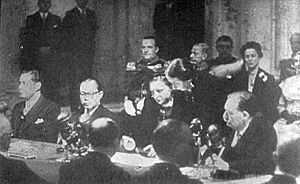
In August 1949, Hatta led a delegation to the Netherlands for a conference. In November 1949, the formation of the United States of Indonesia was agreed upon. It was a federation of the Republic and 15 other states created by the Dutch. The Dutch Queen remained the symbolic head, while Sukarno and Hatta continued as president and vice president. On December 27, 1949, the Dutch finally recognized Indonesia's full independence. Hatta continued as Prime Minister of this new federal state. He oversaw its change into a single, united country on August 17, 1950.
Vice Presidency (1945–1956)
Ideas on Economy and Cooperatives
After Indonesia became a single state, a new constitution made the president a ceremonial leader. This meant Hatta, as vice president, had less to do. He often gave lectures at universities and wrote books about economics. He was very passionate about the idea of cooperatives, where people work together to help each other economically. In 1953, he was even given the title "Father of Indonesian Cooperatives."
Indonesia's Foreign Policy
Hatta also helped shape Indonesia's foreign policy. In 1948, he gave a speech about the Cold War between the United States and the Soviet Union. Hatta said that Indonesia should always put its own interests first. He wanted Indonesia to be independent in its decisions during the Cold War. He also believed Indonesia should be active in world politics. This idea, called the "Independent and Active" doctrine, is still the basis of Indonesia's foreign policy today.
Retirement from Vice Presidency
Why Hatta Resigned
In 1955, Hatta announced he would retire from the vice presidency. He wrote a letter to Sukarno explaining his decision. On the surface, he said the vice president's job was pointless since the president's role was mostly ceremonial. He felt the country was wasting money paying his salary.
However, there were deeper reasons. Hatta strongly believed in democracy. He was becoming worried about Sukarno's increasing power and authoritarian style of leadership. Hatta had tried to advise Sukarno against this path, but he was ignored. Hatta felt he could no longer work with Sukarno. On December 1, 1956, Hatta officially resigned.
After Hatta Left Office
Hatta's resignation shocked many people, especially those from outside Java. They saw Hatta as their main representative in a government that seemed to be dominated by Javanese leaders. His departure contributed to some rebellions and movements that wanted more local control or even to break away from Indonesia. These groups often asked for Sukarno and Hatta to lead together again.
After the Vice Presidency
Critic of the Government
Once out of government, Hatta openly criticized Sukarno. He believed that the revolution was over once Indonesia gained independence. He felt the government should focus on developing the country. Sukarno disagreed, saying the revolution was still ongoing.
In 1960, Hatta wrote a book called Our Democracy, criticizing Sukarno's "Guided Democracy" as a form of dictatorship. Sukarno immediately banned the book. Hatta's old friend Sjahrir was also imprisoned. Hatta wrote to Sukarno, calling the arrest unfair, but it didn't help. The strong bond between the three revolutionary leaders had broken.
The New Order Era
Changes in Leadership
During the time when General Suharto took over the presidency from Sukarno, Hatta mostly stayed quiet. However, in June 1970, just before Sukarno died, Hatta wrote to Suharto. He was disappointed that Sukarno was put under house arrest instead of being put on trial. Hatta wanted the events of the 1965 coup attempt to be fully investigated, and for Sukarno to have a chance to defend himself.
Fighting Corruption
In January 1970, Suharto appointed Hatta and three others to a special commission. Their job was to investigate corruption in the government. The commission's findings showed widespread corruption. However, in August 1970, Suharto ended the commission. Only two cases of corruption were allowed to be investigated further by the government.
Constitutional Awareness Foundation
In July 1978, Hatta helped create the Institute for Constitutional Awareness Foundation (YLKB). This group aimed to be a place for people to criticize Suharto's government. Suharto's government tried to stop their first meeting. But in August 1979, the YLKB successfully held a meeting. Members of the Indonesian Military even attended. During the meeting, the group criticized the government for not fully following Indonesia's state ideology and constitution.
Death and Legacy
Mohammad Hatta passed away on March 14, 1980, in Jakarta. He was buried with a state ceremony. In 1986, the government recognized him as a "Proclaiming Hero."
Soekarno-Hatta International Airport in Jakarta is named in honor of both Sukarno and Hatta. In 2014, a dormitory building at Erasmus University Rotterdam was also named after Hatta.
Personal Life
Hatta had decided he would not get married until Indonesia became independent. His daughter, Meutia Hatta Swasono, later became a government minister.
Awards and Honours
National Honours
Foreign Honours
Awards
- Honorary doctorate from the University of Indonesia (1958)
Images for kids
See also
 In Spanish: Muhammad Hatta para niños
In Spanish: Muhammad Hatta para niños
 | Emma Amos |
 | Edward Mitchell Bannister |
 | Larry D. Alexander |
 | Ernie Barnes |


